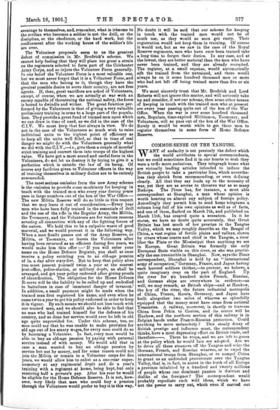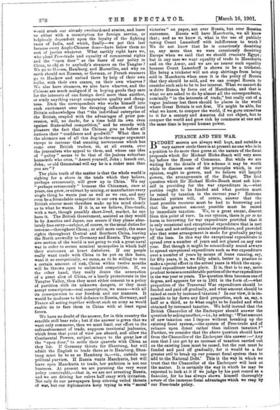COMMON-SENSE ON THE YANGTSE.
WANT of audacity is not precisely the defect which the world attributes to special correspondents, but we could sometimes find it in our hearts to wish they were a trifle more audacious. They telegraph home what are virtually leading articles intended to induce the British people to take a particular line, which neverthe- less they shrink from recommending, or even defining clearly. All that they say leads up to the necessity of war, yet they are as averse to threaten war as so many Bishops. The Times has, for instance, a most able correspondent at Shanghai, a man whose opinion is worth hearing on almost any subject of foreign policy. Accordingly they permit him to send home telegrams a column long full of his own opinions as well as of facts, and one of them, flashed on March 7th, and published on March 11th, has created quite a sensation. In it he states, we have no doubt quite accurately, that Great Britain has lost much of her prestige in the Yangtse Valley, which we may roughly describe as the Bengal of China, a vast region of fertile plains and valleys, cloven by rivers whose centre and chief is the Yangtse, a river liker the Plate or the Mississippi than anything we see in Europe. Great Britain was formerly the only European State visible on this river, as she was practic- ally the one irresistible in Shanghai. Now, says the Times correspondent, Shanghai is held by an "international army of occupation," Germany, France, and Japan having each hurried soldiers thither,—to prevent, we believe, a quite imaginary coup on the part of England. Up the river for six hundred miles French, Russian, and German ships are everywhere in evidence—as well, we may remark, as British ships—and at Hankow, the key of the river, the future industrial metropolis of China, France, Russia, Germany, and Japan have built altogether two miles of wharves so splendidly equipped that the money must have come from national Treasuries. A railway, moreover, is shortly to traverse China from Pekin to Canton, and its centre will be Hankow, and the northern section of this railway is in Belgian hands under Franco-Russian protection. Could anything be more melancholy ? This steady decay of British prestige and influence must, the correspondent thinks, have a most depressing effect on British trade, and therefore—. There he stops, and we are left to guess at the policy which he would fain see adopted. Are we to drive all these steamers off the Yangtse and seize the German, French, and Russian wharves, or to expel the international troops from Shanghai, or to compel China to grant us an undivided protectorate over the Yangtse Valley, that is, in fact, to annex in the teeth of all Europe a province inhabited by a hundred and twenty millions of people whose one dominant passion is distrust and dislike of the foreigner ? The correspondent would probably repudiate such wild ideas, which we have not the power to carry out, which even if carried out would crush our already overburdened armies, and leave us either with a conscription for foreign service, or helplessly dependent upon the loyalty of the fighting races of India, and which, finally—we put this last because every Anglo-Chinese does—have below them no sort of justice whatever. What earthly right have we, who plead Free-trade and equality of commercial rights and the "open door" as the bases of our policy in China, to objsct to anybody's steamers on the Yangtse ? We go to Odessa, Hamburg. and Marseilles, and why on earth should not Russian, or German, or French steamers go to Haukow and unload there by help of their own hulks, with their own cranes, on their own wharves? We also have steamers, we also have wharves, and the Chinese are much maligned if in buying goods they care for the interests of one foreign devil more than another, or study anything hing except comparative quality and cheap- ness. Even the correspondent who works himself into such excitement over the decaying influence of Great Britain acknowledges that "the individual enterprise of the British, coupled with the advantages of prior pos- session, will, no doubt, for a time hold its own even against State-aided competition," and he records with pleasure the fact that the Chinese give us before all nations their " confidence and goodwill." What then is the ultimate use of all this dog-in-the-manger argument except to increase that amazing nervousness which has come over British traders, or, at all events, over the journalists who appeal to them, and whose one idea of "policy " seems to be that of the jealous suburban housewife who cries, "Assert yourself, John ; launch out, John; or old Greenstead will say he is a richer man than you are"? ? The plain truth of the matter is that the whole world is sighing for a share in the trade which they believe, perhaps erroneously, will grow up in China. We say "perhaps erroneously " because the Chinaman, once at peace, can grow, or extract by mining, or manufacture every single thing he wants just as well as we can, and may even be a formidable competitor in our own markets. The British elector must therefore make up his mind clearly as to what he wants. If it is, as we believe, Free-trade, with a vast, though possibly short-lived, market, he can have it. The British Government, assisted as they would be by America and Japan, can secure if they please abso- lutely free entry—subject, of course, to the usual duties for revenue—throughout China; or still more easily, the same rights throughout Central and Southern China, leaving the North avowedly to Germany and Russia. The aggres- sive section of the world is not going to risk a great naval war in order to secure nominal monopolies in which half their statesmen at heart disbelieve. If our people really want trade with China to be put on this basis, want it so energetically, we mean, as to be willing to run a certain amount of risk, China within twelve months will be thrown open to unlimited competition. If, on the other hand, they really desire the annexation of a great slice of China, or a lonely protectorate in the Yangtse Valley, then they must either consent to a policy of partition with its unknown dangers, or they must accept conscription—real conscription, we mean—with all its consequences to our freedom and our manners. It would be madness to bid defiance to Russia, Germany, and France all acting together without such an army as would enable us to face them in China with at least equal forces. We have no doubt of the answer, for in this country the sensible still bear rule; but if the answer is given that we want only commerce, then we must limit our effort to the enfranchisement of trade, suppress territorial jealousies, which from that point of view are absurd, and allow the Continental Powers, subject always to the great law of the "open door," to settle their quarrels with China as they list. If Germany thirsts for Shantung, but will admit the English to trade there as in Hamburg, Shan- tung must be to us as Hamburg is,—viz., outside our political purview. If Russia wants Manchuria, but will leave open Manchuria to trade, her ambition is not our business. At present we are pursuing the very worst policy conceivable,—that is, we are not arresting Russia, and we are driving her rulers half crazy with irritation. Not only do our newspapers keep uttering veiled threats of war, but our diplomatists keep trying to win "moral victories" on paper, not over Russia, but over Russian statesmen. Russia will have Manchuria, we all know that; and as we know it, what is the use of publicly taxing Count Lamsdorff with indifference to truth? We do not know that he is consciously deceiving us, any more than we were consciously deceiving Europe when we said that we should evacuate Egypt; but in any case we want equality of trade in Manchuria and on the Amur, and we are no nearer such equality because Count Lamsdorff is shown to be a trickster. His being a trickster will not stop shirtings from being sold in Manchuria when once it is the policy of Russia that they should be sold, and we can compel Russia to consider such sale to be to her interest. What we cannot do is drive Russia by force out of Manchuria, and that is what we are asked to do by almost all the correspondents, nominally "in the interests of trade," but really out of a vague jealousy lest there should be places in the world where Great Britain is not first. We might be able, for what we know, to conquer the world, if we gave ourselves to it for a century and America did not object, but to conquer the world and grow rich by commerce at one and the same time is beyond human power.







































 Previous page
Previous page